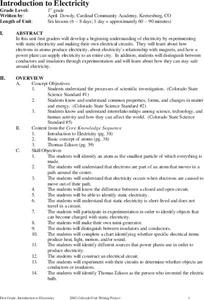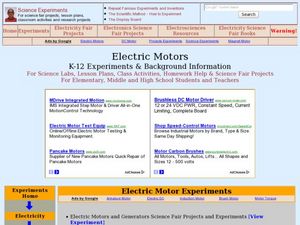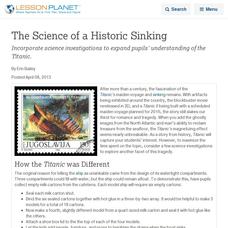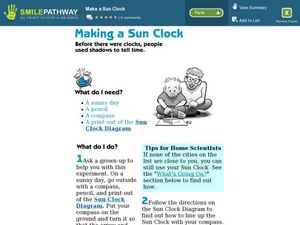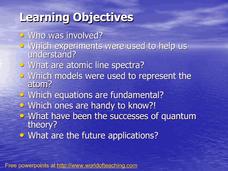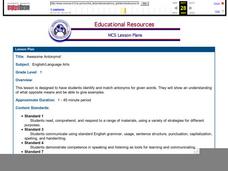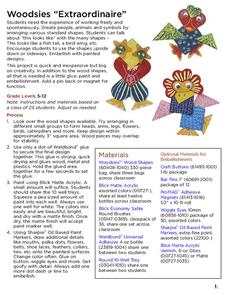Curated OER
The Process Of Addition
Students use manipulatives to explore the notation of addition and gain experience with independent practice. They demonstrate their knowledge by performing the operation on the board with magnets, on their own felt work mat then on...
Curated OER
Introduction to Electricity
Students experiment with static electricity and make their own electrical circuits. Students experiment with their circuits to explore conductors and insulators. Students identify Thomas Edison as the person who invented the electric bulb.
Curated OER
100 Years of Flight
Students investigate Bernoulli's principle of air pressure and how it
relates to the lift of an airplane. Students identify various Aeronautical vocabulary terms. Students construct a paper glider and experiment with the control surfaces...
Curated OER
The Nutrients Public Transportation System
Students investigate the human circulatory system by experimenting with hoses. In this human body instructional activity, students create a system of hoses simulating the circulatory system which they utilize to pass objects...
Curated OER
Electric Motors
Young scholars examine the different types of electric motors including their history and classification. In this motor lesson students complete several experiments with different motors.
Curated OER
Making an Electromagnet
Students explore electromagnetic forces. In this electromagnetic lesson, students construct a working electromagnet and conduct a series of experiments to see what increases the strength of an electromagnet.
Curated OER
Let There Be Light
Fifth graders explore electricity. In this electricity lesson, 5th graders experiment with open and closed circuits. Students determine how to properly connect a battery and bulb to illuminate the bulb.
Curated OER
What is an Electromagnet?
Learners give examples of electromagnet applications. In this physics lesson plan, students explore what makes electromagnets work. They experiment picking paper clips with it.
Curated OER
Map Field of Current
Young scholars determine that moving charges create a magnetic field. They discover that the speed and direction of motion, the amount of charge, and the deflection angle observed are closely linked. A voltmeter, pendulum, and a...
Curated OER
The Science of a Historic Sinking
Incorporate science investigations to expand pupils' understanding of the Titanic.
PHET
Science and Engineering Conference
Young scientists present their experimental designs from the previous experiment. The ninth lesson in the series outlines what learners should present, what class discussions should happen, and the solution NASA came up with for the same...
Curated OER
We're Off To the Races!
Second graders use a magnet to "race" objects from one side of a racing track to another. They predict what the results are, then run the race. Pupils sort and graph which items were successfully moved, they attempt to race again. This...
Curated OER
Making a Sun Clock
For this clock construction lesson, students use a pencil, compass, and sun clock diagram to construct a homemade sun clock. A very interesting lesson on combining images with text.
Cornell University
Glued into Science—Classifying Polymers
Explore the unique characteristics of polymers. A complete instructional activity begins with a presentation introducing polymers. Following the presentation, young scientists develop a laboratory plan for creating substances using...
Curated OER
Impact Craters Activity
Lunar explorers perform an experiment to understand the size of the craters on the surface of the moon. They layer flour, laundry detergent, and cocoa powder in a pan to model the lunar surface. They drop marbles from different heights...
Curated OER
Green Team
Student explore the relationship of static electricity to current electricity, circuits, electromagnets, electro generators, and public electric utilities. In this Green Team lesson plan, 4th graders participate in hands-on science...
Curated OER
Quantum Mechanics
Mostly what you will find here is a history of quantum mechanics. Influential scientists are introduced (along with some of their recorded quotes), the progression of atomic models is reviewed, and finally experssions and equations are...
Curated OER
Student Opinion: How Impulsive Are You?
Sure to spark lively discussion in any Language Arts classroom, this article from The York Times asks the question, 'How much self-control do you have?'. Pupils begin by reading a short passage about a study on delayed gratification and...
Virginia Department of Education
Atomic Structure: Elements
It's all relevant, really. Individuals use the scientific method to learn more about elements, atoms, and their placement on the periodic table. They conduct experiments using materials common in nature to explore how elements affect our...
Curated OER
Awesome Antonyms
Review with your young learners what opposites are and use a fun tag board game called Auntie Alice to practice. After the class plays the game, pairs work on computers practicing with interactive matching/flashcards/concentration games...
Curated OER
Woodsies "Extraordinaire"
Allow your class to use their imaginations and create fun creatures with various wooden shapes and other embellishments. What a great way to encourage your young artists to stretch their minds!
Curated OER
Number Addition Race
Practice basic addition facts and measuring skills. In this addition and measurement lesson, students are provided with drywall tape and work in groups of four at a long table. Partners take turns generating addends and marking the...
Curated OER
Using Graphical Displays to Depict Health Trends in America's Youth
Identify the different types of graphs and when they are used. Learners will research a specific health issue facing teens today. They then develop a survey, collect and analyze data and present their findings in class. This is a...
Cornell University
Nano Interactions
Tiny particles can provide big learning opportunities! Middle school scientists explore the world of nanoparticles through reading, discussion, and experiment. Collaborative groups first apply nanotechnology to determine water...



